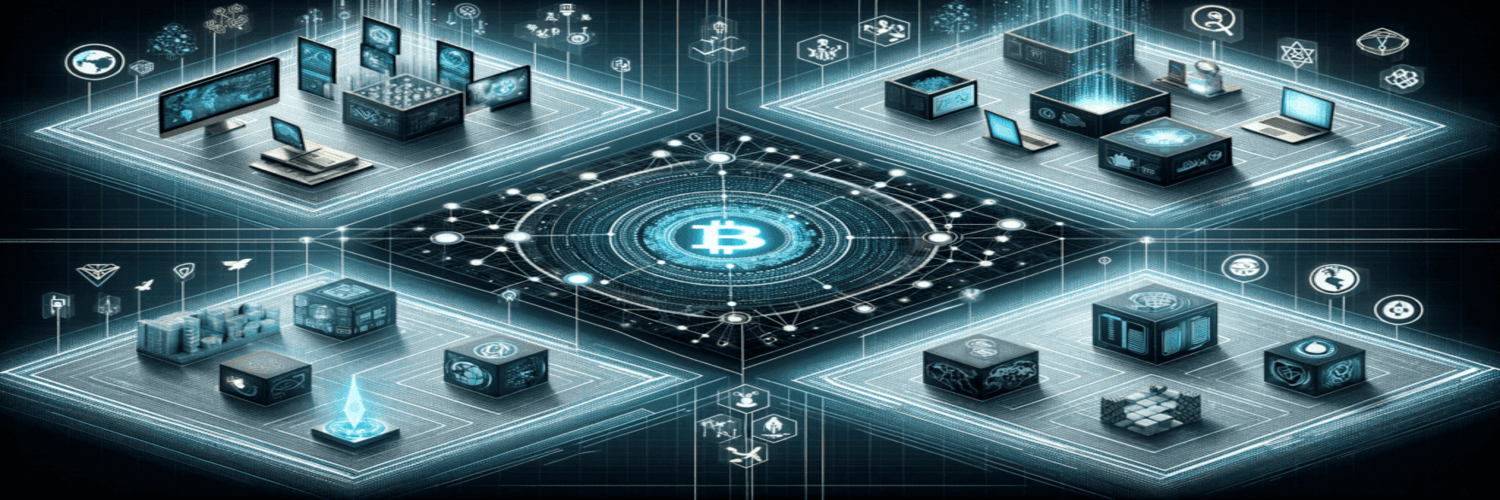When people think of blockchain, they frequently think of Bitcoin. However, blockchain technology has implications well beyond digital currencies like Bitcoin and Ethereum. It is a versatile, decentralized, and secure technology with the potential to transform numerous industries and change the way we think about software development, web development, and machine learning.
This blog examines how blockchain technology is influencing sectors other than bitcoin, as well as the benefits and exciting prospects it brings in the domains of technology and innovation.
What is Blockchain?
At its core, blockchain is a distributed ledger technology (DLT) that securely records transactions across multiple nodes in a network. Blockchain functions in a decentralized manner, guaranteeing transparency, immutability, and resistance to manipulation in contrast to centralized systems. This core idea has elevated blockchain to the forefront of a number of industries, including supply chain management, healthcare and finance.
Blockchain in Software Development
Blockchain technology is driving a paradigm shift in software development. Blockchain is being used by developers to create secure, decentralized applications (dApps) and systems that value transparency and reliability.
- Decentralized Apps (dApps): Blockchain facilitates the creation of decentralized applications (dApps) that run on peer-to-peer networks rather than centralized servers. These apps are resistant to outages, censorship and single points of failure. Ethereum, for example, has emerged as a popular platform for developing dApps thanks to its smart contract feature.
- Secure Authentication: Blockchain technology can simplify authentication operations by eliminating the need for traditional passwords. Developers may create more secure and user-friendly identity verification systems using blockchain technology.
- Version management and Collaboration: The blockchain’s immutable ledger allows for transparent version management in software development endeavors. Teams can track code changes and contributions with unparalleled precision, reducing conflict and enhancing collaboration.
Organizations that include blockchain into software development can construct resilient and future ready systems that meet modern needs for security and transparency.
Blockchain and Web Development
Blockchain is also changing web development by enabling a decentralized approach to building and hosting websites and apps. The following are some examples of how blockchain is affecting things:
- Decentralized Hosting: Traditional web hosting relies on centralized servers, which are vulnerable to outages and hacking. Blockchain-based hosting, such as IPFS (InterPlanetary File System), allows web creators to distribute material via a decentralized network, increasing accessibility and stability.
- Transparent Transactions: Blockchain integration with e-commerce systems ensures safe and transparent transactions. Smart contracts allow for trustless agreements by ensuring that payments and deliveries are performed automatically when particular parameters are met.
- User privacy: By granting users authority over their data, blockchain-based technologies empower users. Decentralized identity solutions can be implemented by web developers, guaranteeing that user data is safely stored and accessible only with authorization.
As web development evolves, blockchain technology is becoming a vital tool for creating innovative, secure, and user-centric online experiences.
Machine Learning Meets Blockchain
Machine learning (ML) and blockchain may appear to be independent technologies, but when combined, they have the ability to alter industries. Blockchain addresses some of the most important ML concerns, including data integrity, privacy and traceability.
- Data Integrity: Blockchain ensures that the data used to train machine learning models is tamper-proof and traceable. This is critical for ensuring the accuracy and dependability of machine learning algorithms. Healthcare systems, for example, can utilize blockchain to validate patient data before feeding it into predictive machine learning models.
- Decentralized AI Marketplaces: Blockchain technology offers decentralized marketplaces for AI models and datasets. Developers may safely share, acquire, and sell machine learning algorithms and data, driving innovation while respecting ownership rights.
- Privacy-Preserving Learning: Combining blockchain with federated learning allows ML models to be trained on decentralized data without transferring sensitive information. This is particularly advantageous for sectors like healthcare and finance.
Blockchain and machine learning integration improves data security while facilitating transparency and cooperation in the creation of AI solutions.
Real-World Applications of Blockchain Beyond Crypto
Blockchain’s versatility has led to its adoption in numerous fields:
- Supply Chain Management: Blockchain enhances transparency and efficiency in supply chains by providing real-time tracking of goods. Companies such as IBM are utilizing blockchain to assure the authenticity and traceability of food from farm to table.
- Healthcare: Blockchain technology improves data transfer and security in healthcare systems. Patients can control access to their medical records, ensuring privacy while allowing for seamless information exchange between doctors.
- Education: Blockchain provides the secure storage and verification of academic qualifications. Institutions can produce tamper proof certificates, which reduces fraud and simplifies verification procedures.
- Voting Systems: Blockchain based voting platforms provide transparency, immutability and security, lowering the possibility of election fraud.
- Energy Trading: Peer-to-peer energy trading platforms driven by blockchain technology allow for safe and transparent transactions between buyers and sellers of renewable energy.
These examples demonstrate how blockchain is transforming a number of industries by eliminating inefficiencies and creating new opportunities for innovation and growth.
Blockchain’s advantages Go beyond cryptocurrency
The specific benefits of blockchain technology are driving its increased adoption:
- Transparency: The blockchain’s immutable record fosters stakeholder trust by offering comprehensive visibility into transactions.
- Security: Blockchain significantly increases security by utilizing cryptographic methods and decentralizing data storage.
- Cost savings: Blockchain reduces intermediaries, streamlining procedures and cutting costs in businesses such as banking and shipping.
- Efficiency: Smart contracts automate procedures, which speeds things up and reduces errors.
- Scalability: Blockchain’s ability to handle vast amounts of data and transactions makes it perfect for large-scale applications.
Challenges and Considerations
Adoption of blockchain has disadvantages despite its benefits:
- Scalability Issues: Several blockchain networks experience issues with huge transaction volumes which lead to delays and increased costs.
- Energy Use: Mining and maintaining blockchain networks may need a significant amount of energy which could have an adverse effect on the environment.
- Regulatory Uncertainty: Adoption may be hampered by governments’ ongoing efforts to define rules and regulations for blockchain uses.
- Skill Gaps: There is a greater need for qualified experts in blockchain, web development, software development and machine learning than there is supply.
To fully utilize blockchain technology and overcome these obstacles, more creativity, teamwork and education are needed.
The Future of Blockchain Beyond Crypto
Blockchain is poised to play a pivotal role in shaping the future of technology and society. Emerging trends include:
- Interoperability: Efforts to enable seamless communication between different blockchain networks will drive wider adoption.
- Blockchain-as-a-Service (BaaS): Cloud providers like AWS and Microsoft are offering BaaS solutions, making blockchain accessible to businesses of all sizes.
- Integration with IoT: Blockchain will enhance IoT ecosystems by providing secure and transparent communication between devices.
- Enhanced Security Models: Combining blockchain with advanced encryption methods will further enhance its security capabilities.
These trends indicate that blockchain’s applications in software development, web development, and machine learning will continue to grow, enabling new levels of innovation and efficiency.


